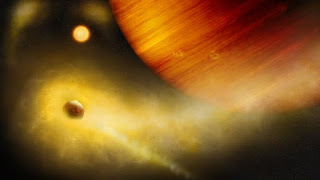astrobiology
Hints of a volcanically active exomoon
A rocky extrasolar moon (exomoon) with bubbling lava may orbit a planet 550 light-years away from us. This is suggested by an international team of researchers led by the University of Bern on the basis of theoretical predictions matching observations. The 'exo-Io' would appear to be an extreme version of Jupiter's moon Io.
Might just be bubbling imagination, but then again, it might be true.

Artist's composition of a volcanic exo-Io undergoing extreme mass loss. The hidden exomoon is enshrouded in an irradiated gas cloud shining in bright orange-yellow, as would be seen with a sodium filter. Patches of sodium clouds are seen to trail the lunar orbit, possibly driven by the gas giant's magnetosphere.
Credit: © University of Bern, Illustration: Thibaut Roger
earth
Deep-sea sediments reveal solar system chaos: An advance in dating geologic archives
In a study published in the journal Science, Richard Zeebe from the University of Hawai'i at Manoa and Lucas Lourens from Utrecht University used geologic records from deep-sea drill cores to extend the astronomical time scale beyond 50 million years, by about 8 million years. Using their new chronology, they provide a new age for the Paleocene-Eocene boundary (56.01 Ma) with a small margin of error (0.1%).
evolution
Ancient teeth shed light on Miocene 'mouse' migration
environment
Burgundy wine grapes tell climate story, show warming accelerated in past 30 years
neuroscience
Blue Brain finds how neurons in the mouse neocortex form billions of synaptic connections
cultural heritage
Scientists explore aged paint in microscopic detail to inform preservation efforts
humans
First human ancestors breastfed for longer than contemporary relatives
Cooper's Ferry archaeological finds reveal humans arrived in Idaho more than 16,000 years ago
People transformed the world through land use by 3,000 years ago
I'd call that a conservative estimate ...















No comments:
Post a Comment